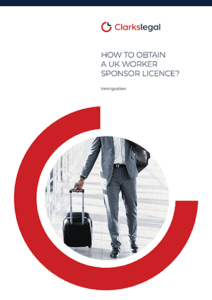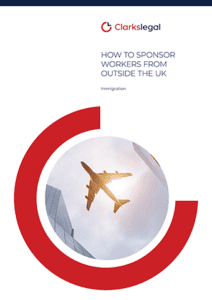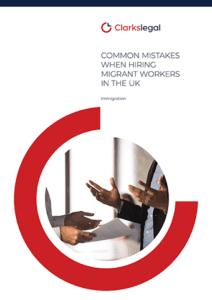Skilled Worker Visa UK
A Skilled Worker visa allows individuals to work in the UK for employers who have been approved as licensed sponsors by the Home Office. As part of the overhaul of the UK’s points-based immigration system following Brexit, the Skilled Worker visa category was launched, replacing the Tier (2) General visa category, and eliminating the requirement for sponsors to conduct a Resident Labour Market Test.
Attention Employers: Starting 4 April 2024 the minimum salary requirement for Skilled Workers will increase from £26,200 to £38,700.
To be eligible for a Skilled Worker visa, an applicant must:
- Have a job offer from a UK employer who holds an A-rated Worker sponsor licence in the Skilled Worker category
- Be assigned a Certificate of Sponsorship (CoS) from their UK sponsor containing information about the job they are coming to perform in the UK – including the CoS reference number, job title, salary, start date, etc.
- Have a job that is on the list of eligible occupations
- Be paid a minimum salary – the minimum threshold depends on the type of work you do
- Meet the English Language requirement by proving they can read, write, speak and understand English to at least level B1 on the Common European Framework of Reference for Languages (CEFR)
In addition to meeting the above criteria, an applicant must also be able to prove that they have enough money to support themselves while in the UK, unless their sponsor certifies maintenance on their CoS.
Whether you are an employer looking to hire or a skilled individual from overseas looking to work in the UK, it is a must to fully understand the Skilled Worker eligibility and application requirements to avoid any hurdles or delays which mistakes on the application might cause.
Here at Clarkslegal we are experts in obtaining Skilled Worker visas with a quick turnaround and 100% success rate. We work closely with many organisations to help them gain and maintain their sponsor licences and furthermore facilitate the sponsorship of skilled workers.
Clarkslegal has been nothing short of exceptional in handling my Skilled Worker visa and my family’s visas. Thanks to their expertise and unwavering support, we successfully landed in the UK. I couldn’t be happier with their services, and I highly recommend Clarkslegal to anyone seeking immigration assistance.
Suresh Babu Thanickachalam
Google Review
Related Services
A Skilled Worker visa is a type of work visa for non-British nationals with specialised skills, knowledge and/or expertise, who have been offered a job by a UK organisation with a Skilled Worker sponsor licence.
The job must be skilled to at least level RFQ3 or above (A level or equivalent) and the applicant must demonstrate a knowledge of English language at a minimum CEFR level B1.
The Skilled Worker visa is part of the UK’s renewed Points Based System. It has a wider audience than its predecessor (the Tier 2 visa) which was intended almost exclusively for Highly Skilled individuals.
No – You must have a job offer from an approved UK employer before you apply for a Skilled Worker visa.
There are other visa categories in the UK which do not require a job offer from a UK sponsor, including:
- High Potential Individual visa
- Graduate visa
- Global Talent visa
- India Young Professionals Scheme visa (for Indian citizens only)
The standard processing time for a Skilled Worker visa application is currently 3 weeks when applying from outside the UK, and up to 8 weeks when applying from inside the UK.
Priority visa services are available for purchase to expedite the application process, as follows:
Overseas Applications
- Priority Visa Service
- Expedites visa processing to 5 working days from the date of the biometric appointment
- The cost of this service normally varies from £250 to £300, in addition to the visa fees (availability of this service is dependent on the country of application)
In-Country Applications
- Priority Visa Service
- expedites visa processing to 5 working days from the date of the biometric appointment
- service cost: £500
- Super Priority Visa Service
- expedites visa processing to 1-2 working days from the date of the biometric appointment
- service cost: £800
Yes – you can switch job whilst on a Skilled Worker visa, so long as you remain with the same employer and your new role falls within the same eligible occupation code as your current position.
If you wish to change employer or move to a role within a different occupation code, you will need to submit a new Skilled Worker visa application.
Yes – you may be able to settle permanently in the UK under the Skilled Worker visa category provided you also meet the following requirements:
- Have continuously lived and worked in the UK for 5 years
- Meet the salary requirements
- Your sponsor confirms in writing that you continue to be needed for your job and meet the salary requirements
- Do not exceed the permitted absences from the UK
- Meet the Knowledge of English and Life in the UK requirements
To be eligible to apply for a Skilled Worker visa, you must meet the following requirements:
- You must work for a UK employer that has been approved by the Home Office
- You must have a ‘certificate of sponsorship’ from your employer, which provides information about the role you have been offered in the UK
- The job you will be doing must be on the list of eligible occupations
- You must be paid a minimum salary, the amount of which depends on the type of work you will be doing
The minimum salary for the type of work you will be carrying out in the UK is determined based on the highest amount from the following options:
- £26,200 per year
- £10.75 per hour
- The ‘going rate’ for the type of work you will be doing
The typical minimum salary level for a Skilled Worker visa is £26,200, with some exceptions. If you benefit from ‘tradeable points,’ such as having a job offer in a shortage occupation or holding a relevant PhD qualification, the lowest minimum salary threshold is currently set at £20,480. Other factors, including occupation code, ‘new entrant’ status, and hours worked, may also affect the applicable minimum threshold.
You must prove your ability to read, write, speak, and understand English to at least level B1 on the Common European Framework of Reference for Languages (CEFR) scale.
You can prove your English language proficiency through the following methods:
- Passing a Secure English Language Test (SELT) from an approved provider.
- Holding a qualifying English qualification, such as GCSE, A level, Scottish National Qualification level 4 or 5, Scottish Higher or Advanced Higher in English, obtained through study at a UK school before turning 18.
- Holding an English-taught degree-level academic qualification. If your degree was obtained abroad, you will need to apply through Ecctis (formerly UK NARIC) to confirm its equivalence to a UK bachelor’s, master’s, or PhD degree.
Exemptions
Nationals of the following countries or territories are exempt from proving their English language proficiency:
- Antigua and Barbuda
- Australia
- The Bahamas
- Barbados
- Belize
- British overseas territories
- Canada
- Dominica
- Grenada
- Guyana
- Jamaica
- Malta
- New Zealand
- St Kitts and Nevis
- St Lucia
- St Vincent and the Grenadines
- Trinidad and Tobago
- USA
When applying for a Skilled Worker visa, there are a set of mandatory documents that must be provided in support of your application:
- Certificate of sponsorship (provided by your employer)
- Proof of your English language proficiency (unless exemption applies)
- Valid passport or identity document showing your nationality and identity
Depending on your circumstances, you might have to provide some or most of the following:
- Evidence that you have enough personal savings to support yourself in the UK, for example bank statements (unless your sponsor certifies maintenance on your certificate of sponsorship)
- Proof of your relationship with your partner or children if they’re applying with you (such as Marriage certificate, Birth certificate, etc.)
- Tuberculosis test results if you are resident of a country listed in Appendix T
- A criminal record certificate – if you’re working in certain jobs
- A valid ATAS certificate if your job involves researching a sensitive subject at PhD level or higher
- Your UK PhD certificate, or your unique Ecctis reference number (formerly unique UK NARIC reference number) if your qualification is from outside the UK – you’ll need to apply through Ecctis
To apply for a Skilled Worker visa, you can follow these steps:
- Obtain a job offer from a UK employer approved by the Home Office. Ensure that the job is eligible under the Skilled Worker visa category.
- Have your employer provide you with a ‘certificate of sponsorship’ (CoS) containing information about the offered role. Your employer will usually handle this step.
- Prepare the necessary documents including certificate of sponsorship (provided by your employer), proof of your English language proficiency (unless exemption applies) and valid passport or identity document showing your nationality and identity.
- Apply online through the UK Government’s official website by creating an account and complete the Skilled Worker visa application form.
- Pay the required application fee, which will vary depending on factors such as your nationality and the length of your intended stay.
- Schedule and attend a biometric appointment at a visa application centre (if applicable) to provide your fingerprints and photograph.
- Submit your supporting documents with your online application.
- Await a decision on your visa application. Processing times can vary.
- If your application is approved, you will receive a decision letter and a vignette (sticker) in your passport, which will allow you to travel to the UK.
We recommend to seek professional advice for the most up-to-date and accurate information regarding the Skilled Worker visa application process.
Yes, you can apply to extend your Skilled Worker visa in the UK provided you continue to meet the requirements of the Skilled Worker visa category.
Skilled Worker visa holders who are currently in the UK have the option to extend their visa before it reaches its expiration date. It is important to note that applications for extending the Skilled Worker visa cannot be made from outside the UK. The eligibility for extension is contingent upon meeting the criteria of continued employment in a qualifying role, earning the required salary, and working for a sponsoring employer. These requirements must be supported by evidence in the extension application.
To apply for an extension, applicants must obtain a new certificate of sponsorship and fulfil all the necessary application requirements. If the applicant’s visa is due to expire during their employment period, it is their responsibility to apply for either an extension or Indefinite Leave to Remain (ILR).
Skilled Worker visa applications in the UK can be rejected by UK Visas and Immigration for various reasons. Based on common trends, the main reasons for refusal include:
- Failing to meet the salary requirements: Many application are rejected due to the applicant not meeting the minimum salary threshold for their job. This could be because they misunderstood the rules or used an incorrect salary benchmark.
- Providing incorrect or insufficient information: If applicants provide inaccurate details, miss out on answering questions, or fail to provide requested evidence, their applications may be rejected. Deliberately providing false information also leads to a refusal.
- Failing to meet the genuineness test: If UKVI suspects that an applicant is not genuinely seeking a Skilled Worker visa, such as having a history of non-compliance with immigration rules, the application may be rejected.
- Not meeting the skill requirement for the job: Even with a valid job offer from a UK sponsor, if UKVI believes the applicant lacks the necessary skills for the job at hand (at least RQF level 3), the application may be rejected.
- Concerns about suitability: Refusal can occur if the applicant has a history of exclusion or deportation, poses a risk to public welfare due to conduct, character, associations, or other reasons, has a custodial sentence of 12 months or longer, is a persistent offender, or has been excluded on asylum or humanitarian protection grounds.
- Inadequate funds to support oneself in the UK can also result in refusal.
Yes – from 01 January 2021 any EU citizen who wishes to migrate to the UK must apply for a work permit unless already in the UK with a Pre-settled or Settled status.
Yes – however the minimum salary requirements for a Skilled Worker need to be met which will restrict what hours you can request. You do not have access to public funds or any other type of Government funding which would impact your decision of working for less hours/less money.
The Skilled Worker visa is considered a temporary visa in the UK. It allows skilled workers from outside the UK to come and work in the UK for a specific period of time. The initial visa duration can be up to a maximum of 5 years, depending on the job offer and the sponsor’s license.
However, it’s important to note that the Skilled Worker visa offers the opportunity for long-term residence in the UK. After completing a specific period of continuous residence (5 years), Skilled Worker visa holders may be eligible to apply for Indefinite Leave to Remain (ILR), also known as settlement. ILR grants the right to live and work in the UK without any time restrictions.
So while the Skilled Worker visa itself has a temporary nature, it can be a pathway to obtaining long-term settlement in the UK for eligible individuals who meet the requirements for ILR.
If you lose your job while on a Skilled Worker visa in the UK, there are certain implications and options available to you. Here are some key points to consider:
- Grace period: If you lose your job, there is usually a grace period provided during which you can search for a new job and maintain your lawful status. As of today, the grace period for Skilled Worker visa holders is 60 days
- Finding a new job: During the grace period, you should actively search for a new job that meets the requirements for the Skilled Worker visa. This includes securing a job offer from a different licensed sponsor who can provide a Certificate of Sponsorship (CoS) for your new employment.
- Time limitations: If you are unable to secure a new job within the grace period or do not meet the eligibility requirements for a new Skilled Worker visa, you may need to leave the UK before your visa expires to maintain compliance with immigration regulations.
No, the Skilled Worker visa has replaced the Tier 2 visa which has been cancelled. Prior to December 2020, the Tier 2 visa category was used for skilled workers coming to the UK. However, with the implementation of the new immigration system, the Skilled Worker visa replaced the Tier 2 category. The Skilled Worker visa is part of the UK’s points-based immigration system and allows skilled workers from outside the UK to come and work in the country.
Yes, you can apply for a Skilled Worker visa outside of the UK. The application process for the Skilled Worker visa begins with obtaining a job offer from a UK employer who is a licensed sponsor. Once you have secured a job offer and the sponsor has provided you with your unique Certificate of Sponsorship, you can apply for entry clearance to the UK under the Skilled Worker visa route.


